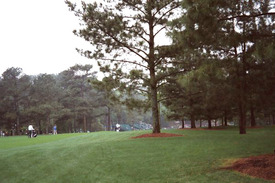Q. And secondly, if you were to have an audience with Hootie this afternoon and he says that you can change one thing about Augusta National, your answer would be --
DAVID TOMS: -- so many rules.
Q. What do you mean by that?
DAVID TOMS: Well, to me it's still a place where the players walk around on eggshells, and you know, not knowing if they are in the right place; they are worried about their cell phone being on; having to stop by the little place, the hut on the way in, to scan your ticket; to making sure you only have one parking pass and somebody else doesn't get in there; to making sure that the wrong person doesn't get your pass and get thrown in jail and try to sell it to somebody else; to not signing autographs in a certain spots or not asking for an autograph in a certain spot; or sitting down at the table too long. It's just one thing after another. It's like, you know, the only place all year where the players don't feel like they are the most important thing there. That's the way I see it and I don't think that I'm the single opinion on that. So that would be the only thing.
And this fine follow up...
Q. You mentioned stopping by the hut to scan the ticket; did you guys have to do that?
DAVID TOMS: Yeah, when you pull in the parking lot you go by this little hut on the way in to scan your ticket. I don't even know what it's all about. It's like CIA stuff, you know what I mean. I don't know, to me it's just uncalled for. It's not, you know, you can't have your instructor here, you've got a major championship and you can't have your instructor walk down the fairway with you to prepare for the golf tournament. You know, it's just one after another. It's like the book of rules and I just think it's a little over the top, that's all I'll say.
Q. Do you think Tiger has ever had to stop and get his ticket scanned?
DAVID TOMS: You know, that's the thing. That's the thing, if he doesn't, why is he any different than me or the Pub Links Champion? But, you know, I just feel it's that way.
In a way, it makes it different and it makes it special and it makes it just kind of unique, but then again, it's still a golf tournament in the end. It's the players that make that tournament. It's Phil Mickelson and Tiger Woods battling down the stretch that headaches that event successful on television around the world. It's not how green the grass is on No. 1 fairway. So, you know, we'll see, but I don't see that changing, either. I don't think I'm going to get my time in front of him until I win the tournament.
Q. Another Masters question, on the back nine on Sunday, we didn't get that jolt that just makes it feel like The Masters, and I wonder how much of that was the design or just guys not taking advantage of the opportunity, any opinion there?
DAVID TOMS: It is the design. You know, it's just different, and I don't think you're going to see that anymore. You know, you saw it the year that Ernie and Phil were battling down the stretch because you're talking about two of the longest hitters in the game and two of the best players, so they were able to have some dramatics and have the power to do it.
You know, when I'm on 15, I hit a good drive and I still was almost 250 yards out from the middle of the fairway, not only is the chance of eagle not very good, but the chance of birdie is not very good, either. So it's just the golf course is different nowadays and you're not ever going to see a whole lot of heroics from at least half the field. You have a handful of players that can create it, but at the same time, it's even more difficult for them.
I don't think you're going to see that a whole lot more, the back nine. You might see somebody collapse on the back nine because the holes are more difficult but I don't see a big charge. I don't see myself shooting 29 on the back nine ever again like I did in '98, and I don't see anybody else doing it, either. So you know, we'll see, and could be wrong, but I don't think so.
Q. So were guys right in saying it feels more like a U.S. Open, the guys that said that?
DAVID TOMS: Oh, sure, if you brought in the fairways another five yards on both sides and grew that rough up to where it was four inches, that's exactly what you would have. You'd have a Masters/Open because the corridors are getting awfully tight with all of the trees they are putting in. Who knows 20 years from now what it's going to look like with all of the new trees. And the greens are obviously, they can firm them up because of the sub-air system and they can make it play as difficult as they want.
You're thinking, this guy's on a roll. Maybe his take on this trend in all golf course setup, or what he feels is driving this mentality that the players need to be humiliated?
















